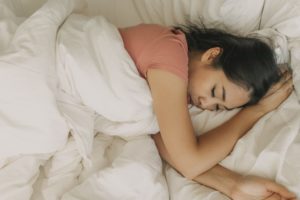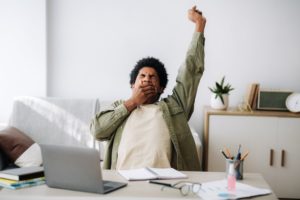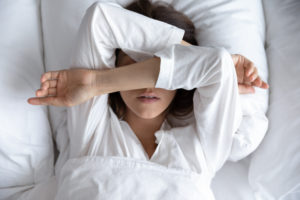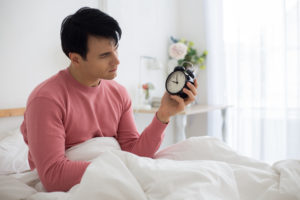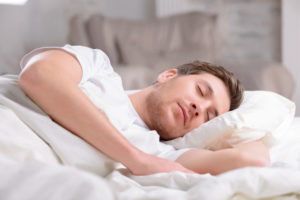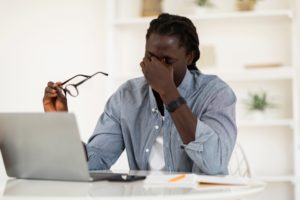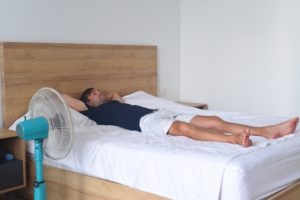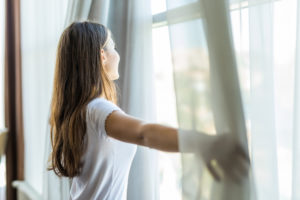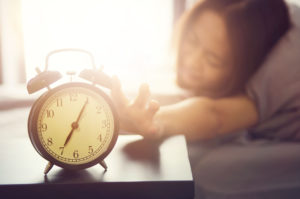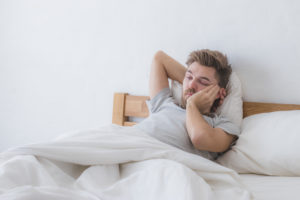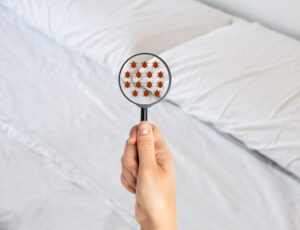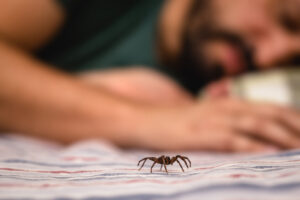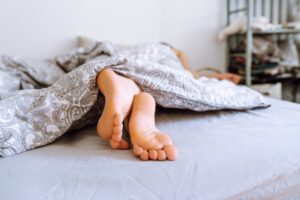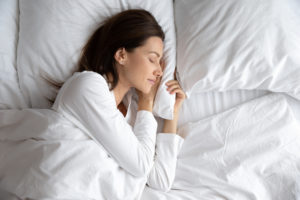When you buy through our links, we may earn a commission. Products or services may be offered by an affiliated entity. Learn more.
How to Fall Back Asleep After Waking in the Night
Waking up in the middle of the night when you would like to be asleep can be a frustrating experience. Luckily, there are multiple research-backed strategies and relaxation exercises meant to promote relaxation and reduce tension.
Deep Breathing
Experts recommend using slow, deep breathing to fall back asleep. This type of breathing may activate the parasympathetic nervous system, which is involved in relaxation and sleep. One such breathing technique is called the 4-7-8 method which involves four seconds of inhalation through the nose, holding the breath for seven seconds, and then exhaling through the mouth for eight seconds.
Looking to improve your sleep? Try upgrading your mattress.
Mindfulness Meditation
Mindfulness meditation may also help improve sleep quality. Mindfulness meditation involves purposefully focusing on the present moment and paying attention to what occurs from a place of curiosity rather than judgment. A variety of techniques exist, including meditation that incorporates specific breathing patterns. People interested in trying mindfulness meditation can seek out courses or listen to recorded guidance using a smartphone or another device.
Box Breathing
To engage in box breathing, breathe in for four seconds, hold the breath for four seconds, exhale for four seconds, and hold the breath again for four seconds. You may find it helps to imagine working your way around a square box as you breathe. Keep repeating this pattern of inhaling, holding, exhaling, and holding the breath again. If four seconds is not the ideal length of time for you, you can adjust it up or down.
Guided Imagery
A recording can help guide you as you practice visualizing somewhere peaceful, like a beach. As you visualize the setting, try to imagine what you would be experiencing through all five senses. For example, try to see, hear, smell, taste, and feel the sensations you would if you were in the setting you are imagining.
Progressive Muscle Relaxation (PMR)
This technique involves progressively tensing and then relaxing each muscle in the body. You can start with your feet, then move up to your head one muscle group at a time, or vice-versa. After you tense a muscle, try to keep it contracted for at least five seconds, then slowly release it. Guided recordings are widely available to talk you through progressive muscle relaxation.
Non-Sleep Deep Rest
Non-sleep deep rest (NSDR) is controlled relaxation without letting your body slip into the first stage of sleep. While the technique is intended for daytime restoration as an alternative to napping, NSDR can be used for sleep.
Similar to yoga nidra, NSDR helps you enter a conscious state of calm. Focus on a specific thought that helps your mind and body relax. Keep this thought at the forefront of your mind and allow the stress and tension in your body to release. Try NSDR on your own or through an audio guide.
Calming Music or ASMR
Research shows that listening to music or white noise can help people fall asleep faster and wake up less during the night. Music and white noise likely promote sleep by blocking out background noise or prompting a relaxation response.
Other sounds can also promote sleep through an autonomous sensory meridian response (ASMR), a response that involves a tingling sensation across the scalp and spine. This response can be triggered by particular sounds or videos, which often involve whispering, slow movements, personal attention, and crisp sounds. Studies suggest that even when a person does not experience a full ASMR response, watching or listening to ASMR material can still improve mood and reduce pain.
What to Avoid Doing When You Wake Up During the Night
Certain activities are best avoided when you wake up during the night, because they can interfere with your ability to fall back asleep:
- Watching the Clock: Studies suggest that clock-watching, which involves closely monitoring what time it is, can make falling asleep more difficult for people with insomnia. While clock-watching, a person might become frustrated that they have not fallen asleep yet, which can increase stress and make sleep even less likely.
- Looking at Electronics and Turning on Lights: Although you might feel tempted to reach for your smartphone, e-reader, or the lamp on your nightstand after waking up during the night, try to resist. Light exposure stops the production of melatonin, a hormone that promotes sleep.
- Staying in Bed Too Long: If you wake up during the night and cannot fall back asleep, experts recommend getting out of bed after 15 to 30 minutes. To help your brain associate your bed with sleeping rather than with being awake, you want to avoid lying awake in bed for too long. Instead, do something relaxing elsewhere, like meditating or reading a book. Then, come back to bed when you feel tired.
Why Do I Wake Up in the Middle of the Night?
Many factors cause people to wake up during the night, such as disruptions in the environment, lifestyle factors, health issues, and aging. We explore the possibilities of what might be waking you up at night.
Environment Factors
Sleep hygiene tips often include the advice to maintain a quiet, dark, cool bedroom, as sensory disturbances can wake a person up during the night. Research suggests that background sounds, such as traffic noises from vehicles on a nearby street, can cause sleep disturbances. In addition to waking people up, these sounds can also prompt the release of the stress hormones adrenaline and cortisol, increase heart rate, and affect digestion.
A study of adults found that even exposure to very dim lightduring the night can negatively impact sleep. Not only can dim light exposure increase nighttime awakenings, but it can also change how much time a person spends in certain stages of sleep. Similarly, environmental factors like room temperature, air quality, and odorscan negatively impact sleep.
Health Changes
Although many people think of insomnia as trouble falling asleep, it can also involve waking in the middle of the night or early morning and having difficulty falling back asleep. Many health issues cause or exacerbate insomnia. Addressing the underlying health issue or sleep disorder is an important step toward regaining better sleep.
Research shows that as people grow older they tend to spend less time in deep sleep and more time in light sleep. Also, they tend to have circadian rhythm changes that can lead to falling asleep earlier and waking up earlier than they would wish. For many adults over 60, health conditions and sleep disorders such as sleep apnea can further contribute to nighttime awakenings.
If you are currently undergoing hormonal changes, they could be responsible for your nighttime awakenings. Studies have found that people tend to experience a reduction in sleep quality during pregnancy and menopause.
Lifestyle Choice
Multiple lifestyle factors can disrupt a person’s sleep:
- Alcohol: Although alcohol may relax you and even seem to help you fall asleep, studies suggest drinking can reduce your sleep quality.
- Stimulants: Caffeine and nicotine are stimulants associated with waking up during the night.
- Certain Medications: Certain prescription medications, including psychotherapeutic medications, beta blockers, opioids, and stimulants, may interfere with staying asleep.
- Evening Digital Device Usage: Studies have shown that devices like smartphones and e-readers that emit blue light can disrupt sleep when used near bedtime.
- Lack of Physical Activity: Exercising regularly can lead to better-quality sleep, while time spent being sedentarymay increase sleep disruption.
When to See a Doctor
Many of the causes of sleep disruption can be easily remedied through changes to the sleep environment or improved sleep hygiene. However, sometimes waking up at night and being unable to fall back asleep indicates a person has a sleep disorder or underlying health problem. If you continue to experience sleep disruption after improving your sleep habits, talk to your doctor. They can ask questions about your situation and refer you to a sleep specialist, if necessary.

Still have questions? Ask our community!
Join our Sleep Care Community — a trusted hub of sleep health professionals, product specialists, and people just like you. Whether you need expert sleep advice for your insomnia or you’re searching for the perfect mattress, we’ve got you covered. Get personalized guidance from the experts who know sleep best.
References
10 Sources
-
Azam, M. A., Latman, V. V., & Katz, J. (2019). Effects of a 12-minute smartphone-based mindful breathing task on heart rate variability for students with clinically relevant chronic pain, depression, and anxiety: Protocol for a randomized controlled trial. JMIR Research Protocols, 8(12), Article e14119.
https://pubmed.ncbi.nlm.nih.gov/31789601/ -
Fujino, M., Ueda, Y., Mizuhara, H. et al. Open monitoring meditation reduces the involvement of brain regions related to memory function. Sci Rep 8, 9968 (2018).
https://doi.org/10.1038/s41598-018-28274-4 -
Krakow, B., Krakow, J., Ulibarri, V. A., & Krakow, J. (2012). Nocturnal time monitoring behavior (“clock-watching”) in patients presenting to a sleep medical center with insomnia and posttraumatic stress symptoms. The Journal of Nervous and Mental Disease, 200(9), 821–825.
https://pubmed.ncbi.nlm.nih.gov/22932731/ -
Cho, C. H., Yoo, H. K., Kang, S. G., Kim, L., Lee, E. I., & Lee, H. J. (2018). Impact of exposure to dim light at night on sleep in female and comparison with male subjects. Psychiatry Investigation, 15(5), 520–530.
https://pubmed.ncbi.nlm.nih.gov/29551048/ -
Harding, E. C., Franks, N. P., & Wisden, W. (2019). The temperature dependence of sleep. Frontiers in Neuroscience, 13, 336.
https://pubmed.ncbi.nlm.nih.gov/31105512/ -
Altun, I., Cınar, N., & Dede, C. (2012). The contributing factors to poor sleep experiences in according to the university students: A cross-sectional study. Journal of Research in Medical Sciences: The Official Journal of Isfahan University of Medical Sciences, 17(6), 557–561.
https://pubmed.ncbi.nlm.nih.gov/23626634/ -
Li, J., Vitiello, M. V., & Gooneratne, N. S. (2018). Sleep in Normal Aging. Sleep Medicine Clinics, 13(1), 1–11.
https://pubmed.ncbi.nlm.nih.gov/29412976/ -
Sedov, I. D., Cameron, E. E., Madigan, S., & Tomfohr-Madsen, L. M. (2018). Sleep quality during pregnancy: A meta-analysis. Sleep Medicine Reviews, 38, 168–176.
https://pubmed.ncbi.nlm.nih.gov/28866020/ -
Kravitz, H. M., Kazlauskaite, R., & Joffe, H. (2018). Sleep, health, and metabolism in midlife women and menopause: Food for thought. Obstetrics and Gynecology Clinics of North America, 45(4), 679–694.
https://pubmed.ncbi.nlm.nih.gov/30401550/ -
Pengpid, S., & Peltzer, K. (2019). Sedentary behaviour and 12 sleep problem indicators among middle-aged and elderly adults in South Africa. International Journal of Environmental Research and Public Health, 16(8), 1422.
https://pubmed.ncbi.nlm.nih.gov/31010026/






